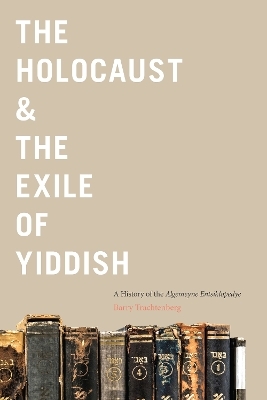
The Holocaust & the Exile of Yiddish
A History of the Algemeyne Entsiklopedye
Seiten
2022
Rutgers University Press (Verlag)
978-1-9788-2545-1 (ISBN)
Rutgers University Press (Verlag)
978-1-9788-2545-1 (ISBN)
- Titel z.Zt. nicht lieferbar
- Versandkostenfrei innerhalb Deutschlands
- Auch auf Rechnung
- Verfügbarkeit in der Filiale vor Ort prüfen
- Artikel merken
Untangles the complicated saga of the Algemeyne entsiklopedye and its editors, who continued to publish volumes and revise the encyclopedia’s mission while their primary audience of Eastern European Jews were facing persecution and genocide under Nazi rule, and then were reestablishing themselves in the first decades after World War II.
In the early 1930s in Berlin, Germany, a group of leading Eastern European Jewish intellectuals embarked upon a project to transform the lives of millions of Yiddish-speaking Jews around the world. Their goal was to publish a popular and comprehensive Yiddish language encyclopedia of general knowledge that would serve as a bridge to the modern world and as a guide to help its readers navigate their way within it. However, soon after the Algemeyne entsiklopedye (General Encyclopedia) was announced, Hitler’s rise to power forced its editors to flee to Paris. The scope and mission of the project repeatedly changed before its final volumes were published in New York City in 1966.
The Holocaust & the Exile of Yiddish untangles the complicated saga of the Algemeyne entsiklopedye and its editors. The editors continued to publish volumes and revise the encyclopedia’s mission while their primary audience, Eastern European Jews, faced persecution and genocide under Nazi rule, and the challenge of reestablishing themselves in the first decades after World War II. Historian Barry Trachtenberg reveals how, over the course of the middle decades of the twentieth century, the project sparked tremendous controversy in Jewish cultural and political circles, which debated what the purpose of a Yiddish encyclopedia should be, as well as what knowledge and perspectives it should contain. Nevertheless, this is not only a story about destruction and trauma, but also one of tenacity and continuity, as the encyclopedia’s compilers strove to preserve the heritage of Yiddish culture, to document its near-total extermination in the Holocaust, and to chart its path into the future.
In the early 1930s in Berlin, Germany, a group of leading Eastern European Jewish intellectuals embarked upon a project to transform the lives of millions of Yiddish-speaking Jews around the world. Their goal was to publish a popular and comprehensive Yiddish language encyclopedia of general knowledge that would serve as a bridge to the modern world and as a guide to help its readers navigate their way within it. However, soon after the Algemeyne entsiklopedye (General Encyclopedia) was announced, Hitler’s rise to power forced its editors to flee to Paris. The scope and mission of the project repeatedly changed before its final volumes were published in New York City in 1966.
The Holocaust & the Exile of Yiddish untangles the complicated saga of the Algemeyne entsiklopedye and its editors. The editors continued to publish volumes and revise the encyclopedia’s mission while their primary audience, Eastern European Jews, faced persecution and genocide under Nazi rule, and the challenge of reestablishing themselves in the first decades after World War II. Historian Barry Trachtenberg reveals how, over the course of the middle decades of the twentieth century, the project sparked tremendous controversy in Jewish cultural and political circles, which debated what the purpose of a Yiddish encyclopedia should be, as well as what knowledge and perspectives it should contain. Nevertheless, this is not only a story about destruction and trauma, but also one of tenacity and continuity, as the encyclopedia’s compilers strove to preserve the heritage of Yiddish culture, to document its near-total extermination in the Holocaust, and to chart its path into the future.
BARRY TRACHTENBERG is the Michael H. and Deborah K. Rubin Presidential Chair of Jewish History at Wake Forest University in Winston-Salem, North Carolina. His books include The United States and the Nazi Holocaust: Race, Refuge, and Remembrance and The Revolutionary Roots of Modern Yiddish, 1903-1917.
Introduction
1. A Bible for the New Age: Berlin, 1930–1933
2. Man Plans, and Hitler Laughs: Paris, 1933–1940
3. Spinning the Historical Threads: New York, 1940–1966
Conclusion
Acknowledgments
Notes
Bibliography
Index
| Erscheinungsdatum | 07.04.2022 |
|---|---|
| Zusatzinfo | 24 color images |
| Verlagsort | New Brunswick NJ |
| Sprache | englisch |
| Maße | 152 x 229 mm |
| Gewicht | 467 g |
| Themenwelt | Geschichte ► Allgemeine Geschichte ► 1918 bis 1945 |
| Geisteswissenschaften ► Religion / Theologie ► Judentum | |
| Geisteswissenschaften ► Sprach- / Literaturwissenschaft ► Sprachwissenschaft | |
| ISBN-10 | 1-9788-2545-5 / 1978825455 |
| ISBN-13 | 978-1-9788-2545-1 / 9781978825451 |
| Zustand | Neuware |
| Informationen gemäß Produktsicherheitsverordnung (GPSR) | |
| Haben Sie eine Frage zum Produkt? |
Mehr entdecken
aus dem Bereich
aus dem Bereich
ein Psychologe erlebt das Konzentrationslager
Buch | Hardcover (2024)
Kösel (Verlag)
22,00 €
Mythos „Stauffenberg-Attentat“ – wie der 20. Juli 1944 verklärt und …
Buch | Hardcover (2024)
Goldmann (Verlag)
24,00 €


